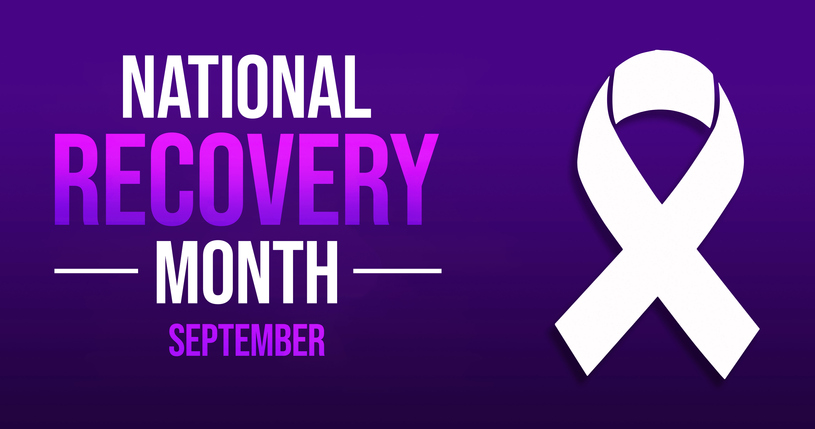By Makeba Royall, LCSW – NASW Senior Practice Associate
In 1989, National Recovery Month was started during the month of September. The purpose of Recovery Month is to raise awareness and promote evidence-based treatment and recovery practices, celebrate the recovery community, and acknowledge service providers and communities that assist individuals with their recovery. Recovery Month provides continued education and encouragement around recovery, elevating accomplishments and reaffirming the possibility of recovery.
SAMHSA defines recovery as a process of change through which individuals improve their health and wellness, live self-directed lives and strive to reach their full potential. Social workers provide counseling and psychotherapy services to patients in recovery. Social workers help patients eliminate psychosocial stressors such as homelessness, loss of job, divorce, and loneliness that may have led to their use of substances. They walk patients through their journey of recovery providing supportive services that lead them to a healthier and rewarding lifestyle.
NASW celebrates Recovery Month and congratulates those in recovery for their resiliency and tenacity. The association shares the following resources with members who work with patients in recovery.
NASW Resources
New Messaging from Faces & Voices of Recovery for Talking About Recovery
Faces & Voices of Recovery (FAVOR) is a national campaign of individuals and organizations joining together with a united voice to advocate for public action to deliver the power, possibility, and proof of recovery from substance-use disorders. FAVOR has developed a language that social workers and others can use to talk with the public and policymakers about recovery from addiction to alcohol and other drugs.
Facing the Opioid Crisis (podcast episode)
David Stoecker, LCSW, is founder and director of Better Life in Recovery. He recommends that we look at the opioid addiction pandemic through a harm-reduction lens, rather than a punitive one. He argues that abstinence is not the only path to recovery and that we need to create healthy communities and to provide recovery support to those who need it.
Additional Resources
Centers for Disease Control and Prevention,
Recovery Is for Everyone: Understanding Treatment of Substance Use Disorders. The CDC explains what substance use disorders are along with different treatment and recovery options and the importance of reducing stigma.
National Center on Substance Abuse and Child Welfare
- Disrupting Stigma: How Understanding, Empathy, and Connection Can Improve Outcomes for Families Affect by Substance Use and Mental Disorders. Brief created to support collaboration amongst teams in their efforts to help reduce stigmas. The brief provides strategies and best practices when working with individuals affected by substance use and mental disorders.
- Understanding Substance Use Disorder Treatment: A Resource Guide for Professionals Referring to Treatment. Resource which provides tools for providers to utilize when working with individuals and families affected by substance use.
- Online Tutorials, for Substance Use Treatment Professionals, Child Welfare Professionals and Legal Professionals.
National Institute on Drug Abuse (NIDA)
NIDA defines recovery and provides descriptions of different types of recovery programs and provides two tools providers can use when working with individuals who are entering recovery.
Online Treatment Locator, the confidential and anonymous resource for individuals seeking treatment for mental and substance use disorders in the United States and its territories.
Substance Abuse Mental Health Services Administration (SAMHSA):
- SAMHSA’s National Helpline, is a free, confidential, 24/7, 365-day-a-year treatment referral and information service (in English andSpanish) for individuals and families facing mental and/or substance use disorders.
- SAMHSA’s Evidence-Based Practices Resource Center, SAMHSA has compiled a list of resources that can help communities, providers and policymakers incorporate evidence-based practices into their work and settings.
- Recovery from Substance Use and Mental Health Problems Among Adults in the United States, recent brief report released in 2023 of self-reports of recovery among adults aged 18 and older in the United States. The findings provide information regarding reasons connected with recovery and how efforts can be made to assist with sustaining recovery.
- Recovery is Real & Holistic, infographic regarding persons in recovery.
Social Media Toolkits
National Recovery Month Partner Toolkit, CDC toolkit which provides social media content to help raise awareness regarding National Recovery Month.
2023 Toolkit for Recovery Month, toolkit which can be used to help with raising awareness through social media, hashtags, and other ideas related to hosting community events to celebrate Recovery Month.
National Recovery Month Events
Faces and Voices of Recovery, list of events during the month of September for Recovery Month.




